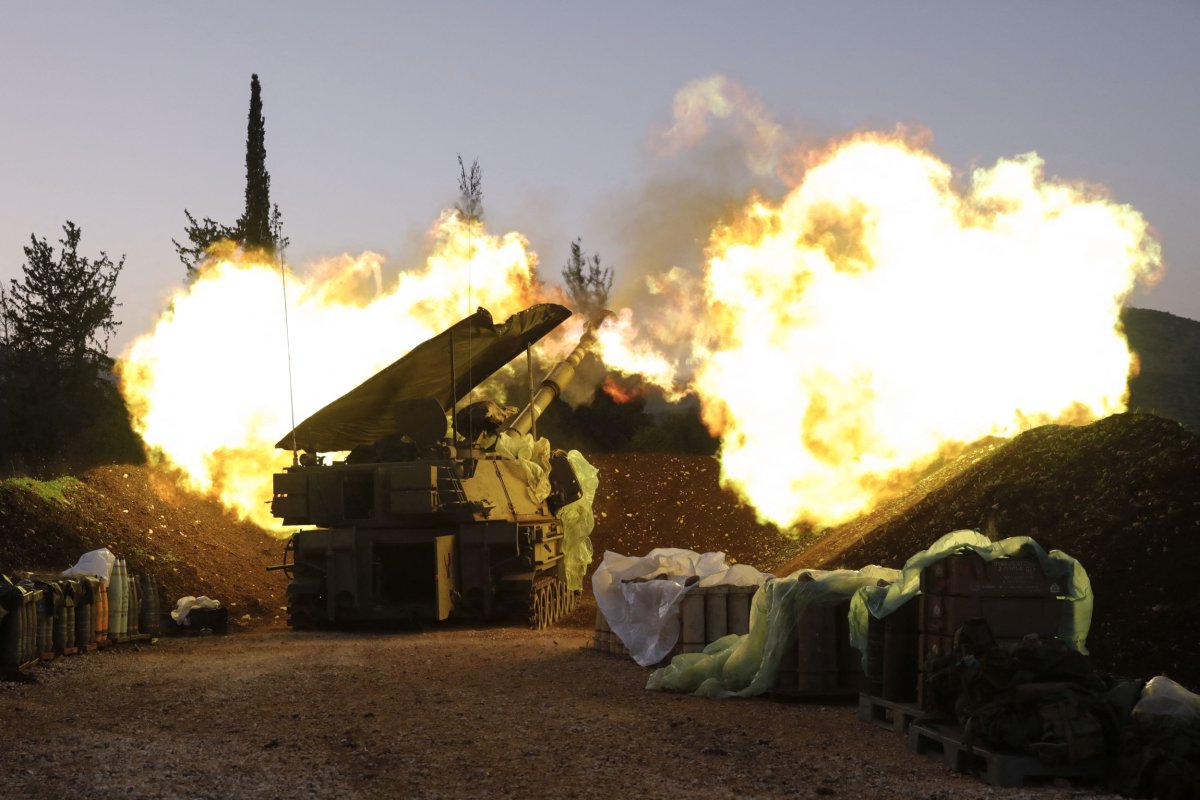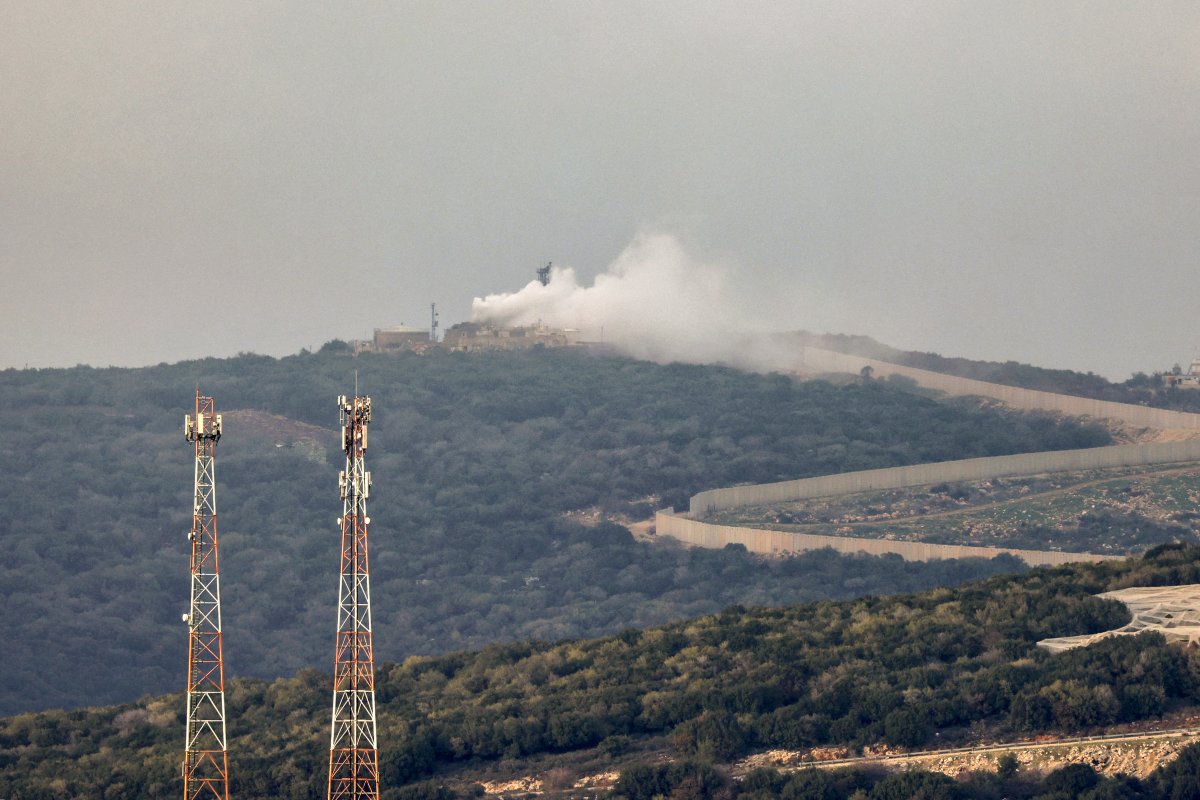Tom O'Connor
 As Israel seeks to neutralize the threat posed by the Hamas movement amid the ongoing war in the Gaza Strip, an Israel Defense Forces (IDF) official has told Newsweek that the country is also looking for a long-term change on its northern front with the powerful Hezbollah movement in Lebanon.
As Israel seeks to neutralize the threat posed by the Hamas movement amid the ongoing war in the Gaza Strip, an Israel Defense Forces (IDF) official has told Newsweek that the country is also looking for a long-term change on its northern front with the powerful Hezbollah movement in Lebanon.Since the IDF launched its full-scale attack on Gaza in the wake of an unprecedented surprise attack conducted by Hamas and other Palestinian factions on October 7, Hezbollah has engaged in an escalating series of clashes with Israeli forces, using rockets, drones, mortars and anti-tank weapons.
With violence on the Lebanese front approaching levels not seen since the last war fought between Israel and Hezbollah in 2006, the IDF official told Newsweek that "we will not return to the situation that was on the 6th of October in the north."
"It means we will not allow our civilians neither in the Gaza envelope nor on the Lebanese border to be under this threat," the IDF official said.
While the IDF official emphasized that "our focus is on Gaza," and that operations continued to be centered on defeating Hamas, the official said that the recruitment of 350,000 additional IDF personnel and the existing capabilities of Israel, including its air force, remained ready to respond to a broader conflict in the north, or anywhere in the region if needed.
"We are prepared for that. We are on alert for that," the IDF official said. "We have the people, the personnel that is exactly ready for that, but we don't want to do that yet."
The Israel-Lebanon border has been a volatile one since the former's foundation as a state in 1948, triggering the first of several major wars fought between Israel and Arab nations backing Palestinian territorial claims. Lebanon, a nation deeply divided along sectarian lines, played little role in these, but found itself at the forefront of the decades-long Israeli-Palestinian conflict while mired in its own civil war that began in 1975.
Following Israel's 1982 invasion of Lebanon, conducted in response to repeated Palestinian commando raids, Hezbollah was established with support from Iran and grew to become one of, if not the most powerful non-state actors in the region. The group has maintained and expanded its vast arsenal despite calls for disarmament in both the Taif Accords that brought an end to Lebanon's civil war in 1990 as well as United Nations Security Council resolution 1701, adopted after the end of a second month-long war fought between Israel and Hezbollah in 2006.
The IDF official with whom Newsweek spoke said that Hezbollah was estimated in 2006 to have around 10,000 rockets and that, by 2019, this figure had jumped to 100,000 rockets. This year, the group is estimated to have 200,000 rockets, as well as mortars, unmanned aerial vehicles, surface-to-air missiles and other weapons capable of reaching "all of Israel pretty much," according to the IDF official.
Hezbollah is also known to possess an array of precision-guided munitions that Secretary-General Hassan Nasrallah has warned would be put to use should another all-out war erupt.
While the situation has yet to reach this point, the frequency and scope of clashes along the so-called "Blue Line" patrolled by 10,000 U.N. Peacekeeping Force in Lebanon (UNIFIL) troops from 47 nations has steadily escalated since October 7.
Reached for comment, a representative of Hezbollah referred Newsweek to the group's official media website, which featured reports of a number of different attacks conducted Wednesday on various Israeli military sites "in support of our steadfast people in the Gaza Strip and in support of their valiant and honorable resistance."
Also featured were the words of Hezbollah Deputy Secretary-General Sheikh Naim Qassem, who on Tuesday defended the campaign against Israel as being in the best interests of both the Lebanese and Palestinian people, as well as "a duty, because this enemy can only be understood in the language of force to deter it and prevent it from achieving its goals now and in the future."
"In addition to this, we will not bow to any signal from any side that talks about a settlement, weakening or putting an end to this weapon," Qassem said, "because it is force that makes us live in our country independently and with its head held high, and it makes us able to face challenges and put an end to the brutality that grows and spreads."
The IDF too reported on the latest attacks coming from Lebanon on Wednesday, as well as from neighboring Syria on Tuesday, announcing new airstrikes and artillery fire against the points of origin. The IDF accused Hezbollah on Tuesday of carrying out launches near a U.N. compound in Lebanon, something of which it said UNIFIL had been notified.
UNIFIL spokesperson Andrea Tenenti told Newsweek that peacekeepers "are deeply concerned by the escalation of violence and rhetoric along the Blue Line."
"We are in constant contact with authorities in Lebanon and Israel to try to reduce the temperature, and we continue to urge all parties involved to stop their fire and work toward a political solution," Tenenti said. "Despite the daily exchanges of fire, the conflict has largely remained confined to areas near the Blue Line and both sides have said they are not looking for a wider conflict which means they don't have an appetite to escalate things further."
"Nonetheless, the continued active exchanges of fire open the very real possibility that a miscalculation could occur," he added. "That's a real concern for us and why it's important to stop the exchange of fire now."
UNIFIL has already reported on several attacks hitting its own positions, as well as the wounding of some of its forces. Israel was blamed for at least one of these incidents. The Lebanese Armed Forces also reported last week on the first death of one of its soldiers as a result of Israeli strikes, followed by news issued Wednesday by Lebanon's state-run National News Agency that a local official had been killed by cross-border fire.
With the threat of conflict spreading between two nations with no official ties and locked in a perpetual state of war, Tenenti said UNIFIL commander Major General Aroldo Lázaro Sáenz "has been ensuring from the very beginning of the conflict an open line of communication to facilitate the de-escalation of the situations, reduce tensions, and prevent any potential misunderstandings that could lead to dangerous outcomes."
Tenenti also reiterated UNIFIL's support for U.N. Security Council resolution 1701, which he said "is under stress, but right now it is more important than ever" as "its principles of security, stability and for a long-term solution remain valid even today."

Smoke billows from an Israeli army post on the border with Lebanon after it was hit by a rocket on December 12. It came amid increasing cross-border tensions as fighting continues with Hamas militants in the southern Gaza Strip.
The IDF official with whom Newsweek spoke also called for the implementation of this resolution, asserting that "we need to see that area that could be the launching pad for conquering the Galil look very, very different when we return our civilians there."
Around 200,000 people have been evacuated from Israeli communities near Gaza and Lebanon, including from Israel's northern Galilee (Galil) region. As the IDF presses on with a war that has also around three-quarters of Gaza's 2.3 million people, as well as tens of thousands in southern Lebanon, the IDF official issued an appeal for a global support.
"How will we reach that goal? There are steps that need to be taken for the benefit of everyone," the IDF official said. "And how will the international community stand up to that? How will the state of Lebanon stand up to that? How will UNIFIL stand up to that?"
"This is a big question for all of us," the IDF official added. "What is that thing in the north? Are we allowed to leave that event to continuously be there, or do we need to act? And the 'we' here is not only Israel. That's a question for many countries."
The IDF official also took direct aim at Iran and its nuclear program. Iranian officials have always denied seeking a nuclear weapon but have supported regional groups such as Hamas and Hezbollah in their campaigns against Israel, which is widely suspected to have a nuclear arsenal.
An Israeli official told Newsweek in November that an elite Iran-backed unit known as the Imam Hossein Division had arrived in Lebanon to support Hezbollah's operations.
"And if we take this to the next level," the IDF official with whom Newsweek spoke more recently said, "what do we say about Iran with a nuclear capability? When these regimes that call for the annihilation, for the destruction of the U.S. and Israel, should we take them seriously?
"And we've paid the most horrific price to say that we must take them seriously."
Iranian Ambassador to the United Nations Amir Saeid Iravani later offered an in-depth response to the prospects of greater Israeli action against Hezbollah or even the Islamic Republic itself during an interview with Newsweek published Friday.
Among other things, Iravani stated that "Israel lacks the capacity to undertake invasions without the unequivocal backing of the United States," a situation that gives rise to "a critical juncture where America must consider conditioning and constraining this support or risk falling prey to the thwarted ambitions of Israel's leadership."
He also said that Tehran does not seek a broader conflict but would be prepared to fight one.
"Iran remains resolute in its stance of refraining from initiating a war with any country. Essentially, a preemptive war strategy holds no position within Iran's defense doctrine," Iravani said. "However, the country maintains its highest state of preparedness to respond to any perceived threats and vigorously defend itself, its populace, and its interests."
No comments:
Post a Comment